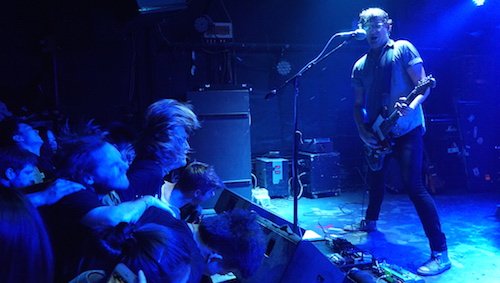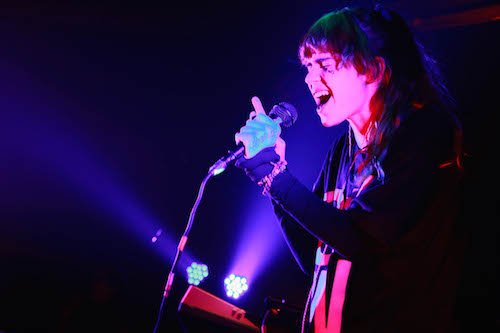Remembering Mao: Founder Li Chi Reflects on the Venue’s Closure and His Mobile Livehouse Plans
After several tumultuous months, Li Chi is finally laying his livehouse to rest. The founder and owner – who also manages local indie rock stars like Residence A and Escape Plan – wouldn’t respond to specific questions earlier this week when he announced that his beleaguered Mao Livehouse was closing for good. Below, Li opens up about the closure and lays out some of his future plans.
How does it feel to finally close Mao?
I don't really want to think about this at the moment ...
I thought you said Mao would close months ago. Why the delay?
It's because the landlord is a very emotional guy. He let us stay as long as possible.

What will you do next? Do you plan to open a new bar or livehouse?
We will launch a new mobile livehouse label, as a transition to a new Mao. We will go to unexpected locations for "secret live music performances.” Meanwhile, we are looking for a new permanent space that's suitable for Mao.
What sort of new place would be suitable? What criteria would be necessary – lower rent, a different neighborhood, or something else?
Yes to all that. It will probably be in either the north or the east of Beijing.
What did you mean a moment ago when you said “secret shows” and a “mobile livehouse?”
We will try to make a livehouse that can be everywhere: it can be your living room, your office space, a warehouse, or anywhere you can or can't imagine it to be. By “secret show” I mean we will make a location announcement in advance, but no lineup announcements until the last minute.
I’m excited to do this because I believe no one has really ever done a mobile livehouse quite like this before. I’m going to keep doing this, because I love it.
Mao Livehouse's closure has also prompted Beijing's music diehards to reflect on the venue's legacy, many of whom weigh in below.
Liu Hao, bassist for Casino Demon and Joyside
Before we broke up, Joyside played its last show at Mao on September 12, 2009. About 800 people were packed inside, and another 200 were outside, unable to get in. After the performance, we had to run away through the back door.
Bian Bian, singer for Candy Monster
Mao has accompanied us through many happy times. We are very reluctant to lose such a fun place. But I’m grateful that Mao gave us a world of memories about rock and roll throughout our youth.
Yang Haisong, P.K. 14 vocalist, Alpine Decline bassist, and CEO of Maybe Mars
I think the "mobile live house " idea sounds cool, but ... I hope they can find a new permanent location soon. That would be great for the Beijing music scene.

Krish Raghav, Content and Media Coordinator at Split Works
I actually saw my first ever indie gig in China at Mao, way back in 2012. It was the post rock band Zhaoze, from Guangzhou, and they were playing their 1911 album in its entirety. They'd strung small lights all over the stage, and the setup was spectacular. It was one of the shows that really got me into Chinese indie, and to eventually work in the scene.
Philipp Grefer, Co-Founder, FakeMusicMedia / FakeLoveMusic (who also DJ’s as Metro Tokyo)
On the very first night that I came to Beijing, in May 2007, I went to Mao Livehouse. I met Jonathan Campbell, the author of Red Rock, at the show, so it was my introduction into the Chinese music scene. I’ve had a lot of good nights at Mao since then. The next year Helen (Feng) invited me to see her band Free The Birds, it was a record release party. At the time I thought: “Ok, let’s see how that goes.” But they definitely didn’t disappoint [laughs]. The rest is history, as they say.
Mao Livehouse's final gig will be held on April 24. The lineup has been expanded from its initial batch of evening shows to also include an afternoon of mosh pit mayhem. Here are the details:
Afternoon lineup: Children Cinema, Muppets, Byebye Noise, Super Lads. RMB 80, RMB 60 (online early bird)
Evening lineup: Escape Plan, Wenqi Li, Residence A, Self portrait. RMB 300, RMB 200 (advance)
Photos: Li Chi, Split Works
Comments
New comments are displayed first.Comments
![]() Kyle Mullin
Submitted by Guest on Tue, 04/19/2016 - 14:42 Permalink
Kyle Mullin
Submitted by Guest on Tue, 04/19/2016 - 14:42 Permalink
Re: Remembering Mao: Founder Li Chi Reflects on the Venue’s...
Helen Feng wrote in to say:
"I remember walking into MAO during one show where the club was so sweaty, hot and full of bodies that my friend's cigarette went out with a hiss. It was the first club we played in China where we thought: 'This is going to change everything.'"
Validate your mobile phone number to post comments.

